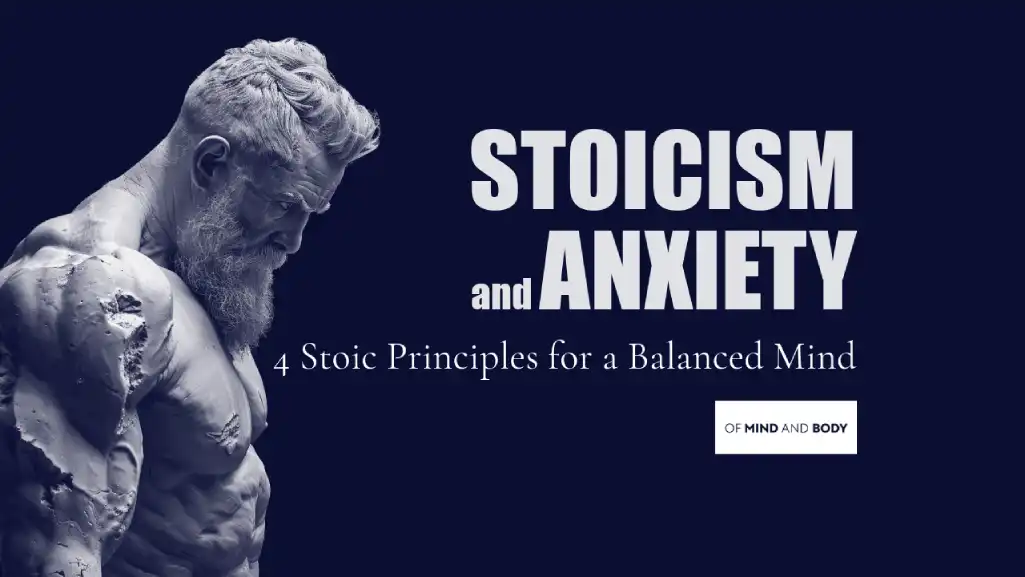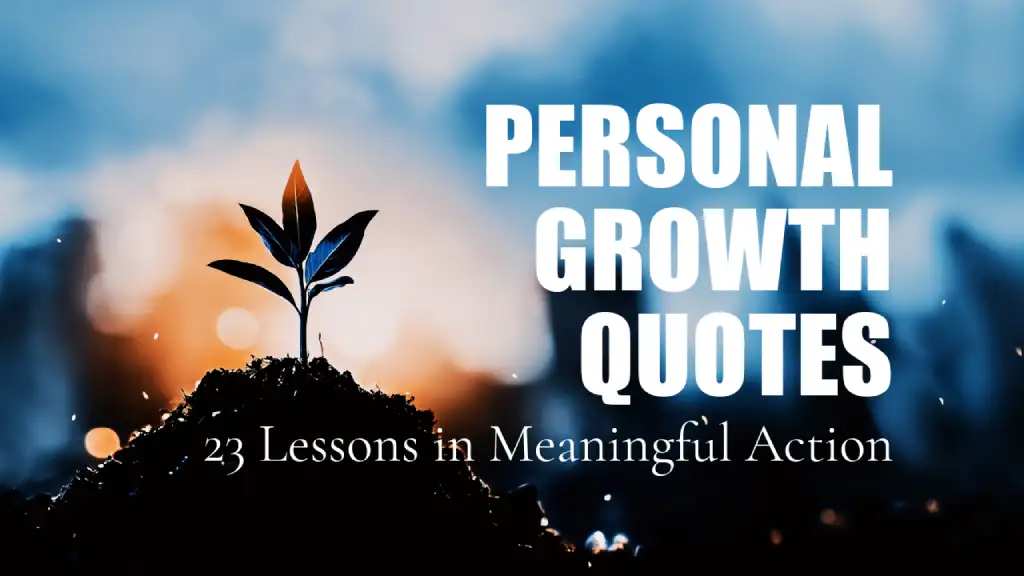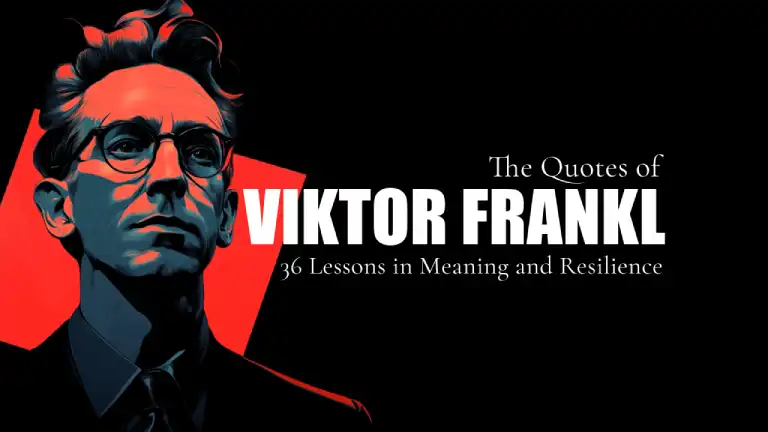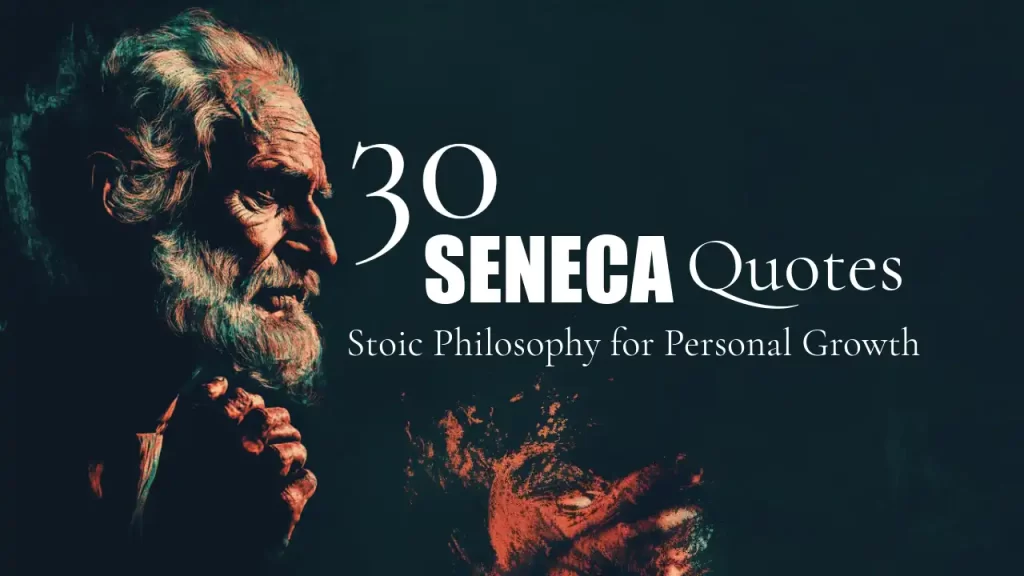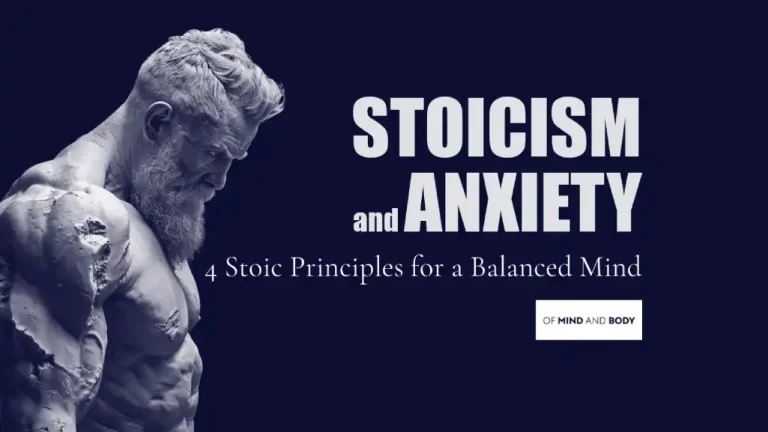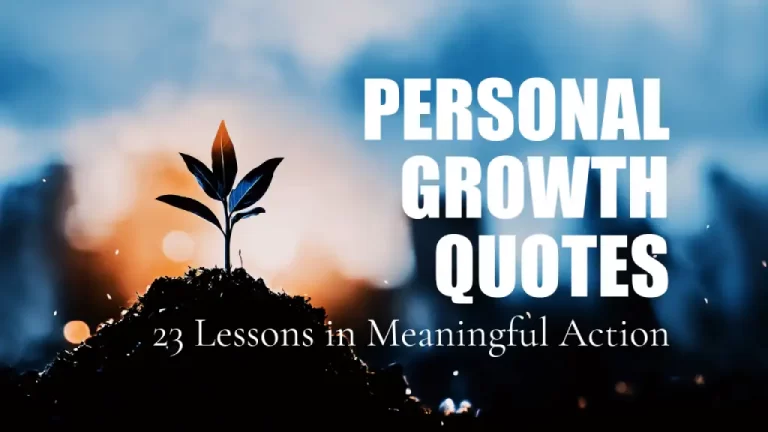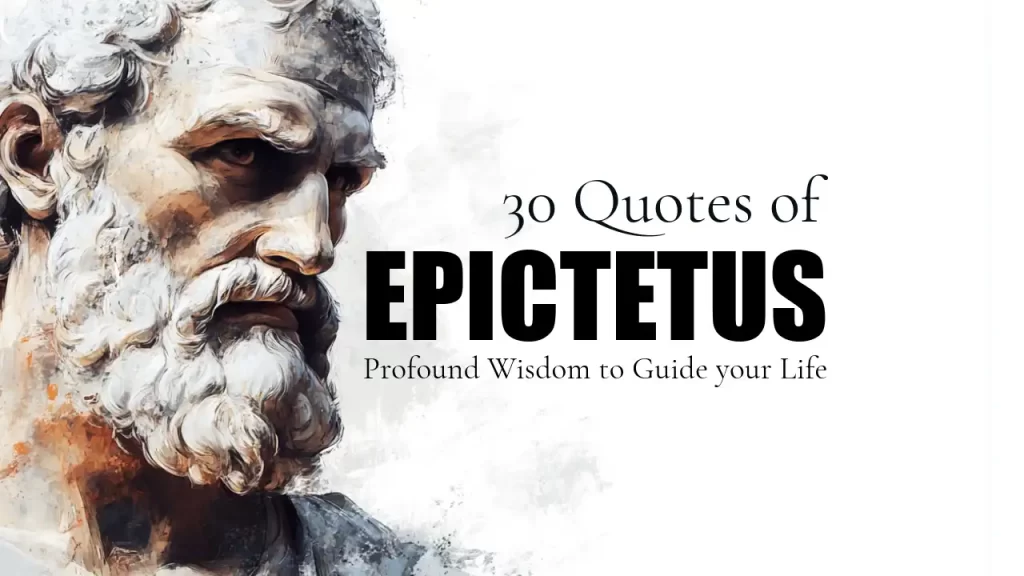
In the realm of ancient philosophy, few figures have left as enduring a legacy as Epictetus, a Stoic philosopher whose teachings continue to resonate in our modern world. His wisdom, captured through his discourses and aphorisms, offers profound insights into living a life of virtue, resilience, and inner peace.
The quotes of Epictetus are not just relics of the past; they are timeless principles that provide practical guidance on how to navigate the complexities of contemporary life. In this article, we will explore some of the most powerful quotes of Epictetus, delving into the deep wisdom behind his words and how they can be applied to improve our daily existence. Whether you are seeking personal growth, emotional strength, or simply a more meaningful life, the teachings of Epictetus offer a valuable path forward.

The Quotes of Epictetus
#1
“Happiness and freedom begin with a clear understanding of one principle: Some things are within our control, and some things are not.”
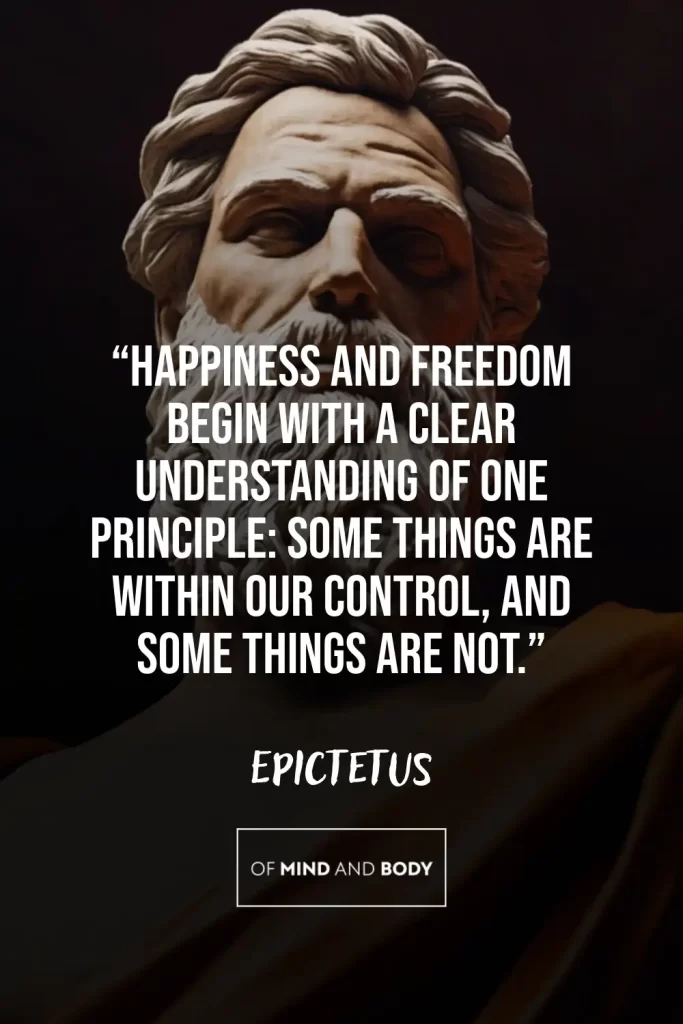
The Wisdom Behind the Words:
Epictetus highlights a fundamental Stoic principle in this quote—the dichotomy of control. He emphasises that true happiness and freedom arise from understanding and accepting the boundaries of what we can and cannot control. By distinguishing between the two, we can focus our energy and attention on what we have the power to influence, while letting go of the rest. This understanding frees us from the anxiety and frustration that comes from trying to control the uncontrollable. It’s a reminder that much of our emotional distress stems not from the external events themselves but from our inability to accept their uncontrollability.
Modern-Day Application:
In modern life, this concept is incredibly relevant, especially in a world where we are constantly bombarded with information, much of which is outside our influence. Whether it’s global events, the opinions of others, or even the weather, accepting that we cannot control these factors is crucial to maintaining mental well-being. Instead of wasting energy on what we cannot change, this wisdom encourages us to focus on our reactions, decisions, and personal growth. For example, in a stressful job, you may not control the company’s decisions, but you can control your attitude and how you manage your work. By applying this aspect of the Quotes of Epictetus, we can cultivate a mindset that leads to greater inner peace and resilience.
#2
“Wealth consists not in having great possessions, but in having few wants.”

The Wisdom Behind the Words:
Epictetus challenges the conventional notion of wealth by redefining it in terms of desires rather than possessions. According to this quote, true wealth is not about amassing material goods but about reducing one’s desires. The fewer desires you have, the less dependent you are on external things to find satisfaction and contentment. This reflects the Stoic emphasis on self-sufficiency and the belief that true fulfilment comes from within rather than from external sources. It encourages a minimalist mindset, where the focus is on appreciating what you have rather than constantly seeking more.
Modern-Day Application:
In a consumer-driven society where people are often judged by the size of their bank accounts or the luxury of their possessions, this Stoic Quote offers a refreshing perspective. It speaks to the growing movement towards minimalism and the realisation that less can indeed be more. By applying the Quotes of Epictetus, individuals can escape the endless cycle of consumerism and find peace in simplicity. For instance, instead of striving to own the latest gadgets or fashion, one can focus on cultivating meaningful experiences and relationships. This shift not only reduces financial stress but also leads to a deeper, more lasting sense of satisfaction that isn’t tied to material wealth.
#3
“Fortify yourself with contentment, for this is an impregnable fortress you will have over your own life.”

The Wisdom Behind the Words:
Contentment, according to the Quotes of Epictetus, is the ultimate form of self-defence against life’s challenges. By fortifying oneself with contentment, you create a mental and emotional stronghold that is impervious to the ups and downs of external circumstances. This quote highlights the Stoic belief in the power of mindset over external situations. Contentment doesn’t mean complacency; rather, it’s about finding peace and satisfaction in the present moment, regardless of what it brings. It is an internal state that shields you from the corrosive effects of envy, greed, and dissatisfaction.
Modern-Day Application:
In the fast-paced and often competitive world we live in today, cultivating contentment can serve as a powerful antidote to stress and unhappiness. Many people are caught in a perpetual chase for the next promotion, purchase, or achievement, believing that happiness lies just beyond the next milestone.
This Stoic Quotes of Epictetus suggests that instead of seeking external validation or success, one should work on being content with what they have. Practising gratitude, mindfulness, and focusing on the present are practical ways to build this fortress of contentment. By doing so, you equip yourself with the resilience to withstand life’s inevitable challenges without being easily shaken.
#4
“It is not what happens to you, but how you react to it that matters.”
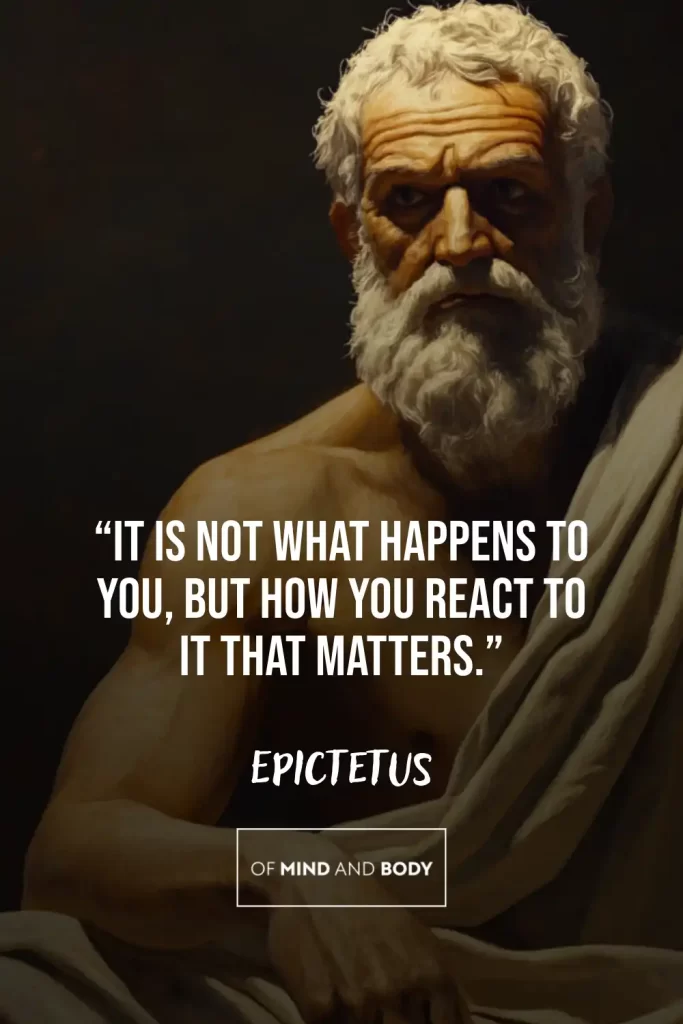
The Wisdom Behind the Words:
This quote encapsulates one of the core tenets of Stoicism: the belief that we have control over our responses to external events, even if we cannot control the events themselves. Epictetus is reminding us that the true measure of our character is not defined by what happens to us, but by how we choose to respond. This perspective empowers individuals to reclaim their agency, even in situations that seem overwhelming or unjust. It is a call to focus on our inner strength and resilience, rather than becoming victims of circumstance.
Modern-Day Application:
In today’s world, where unpredictable and often negative events are a part of life, these Quotes of Epictetus are particularly powerful. Whether dealing with personal challenges like loss or failure, or larger societal issues like economic downturns or global crises, the ability to control our reactions is crucial. By internalising this wisdom, people can shift from a reactive mindset to a proactive one. Instead of letting anger, fear, or despair dictate their actions, they can choose responses that are thoughtful, constructive, and aligned with their values. This approach not only fosters personal growth but also contributes to a more balanced and purposeful life.
#5
“Keep your intention pure. Emotions will try to distract you. So keep going. That’s the cure.”

The Wisdom Behind the Words:
Epictetus here emphasises the importance of maintaining clarity of purpose in the face of emotional turmoil. Emotions, while natural, can cloud judgement and lead us astray from our goals and values. By keeping our intentions pure—focused on what is right and necessary—we can navigate through distractions and remain on course. These quotes of Epictetus reflect the Stoic commitment to rationality and virtue, suggesting that the “cure” for the turbulence of life lies in unwavering dedication to our principles, regardless of how emotions might pull us in different directions.
Modern-Day Application:
In the contemporary world, where distractions and emotional triggers abound, maintaining focus and intention is more challenging than ever. These Stoic Quotes of Epictetus are a valuable reminder for anyone facing the daily pressures of modern life—whether in personal relationships, career challenges, or societal issues. By staying true to one’s intentions and not letting fleeting emotions dictate actions, individuals can achieve a sense of purpose and direction that is often lost in the chaos of modern living. Techniques such as mindfulness, meditation, and reflective journaling can help in keeping intentions clear and emotions in check, ensuring that one continues to progress toward their goals without being derailed by momentary disturbances.
#6
“First say to yourself what you would be; and then do what you have to do.”
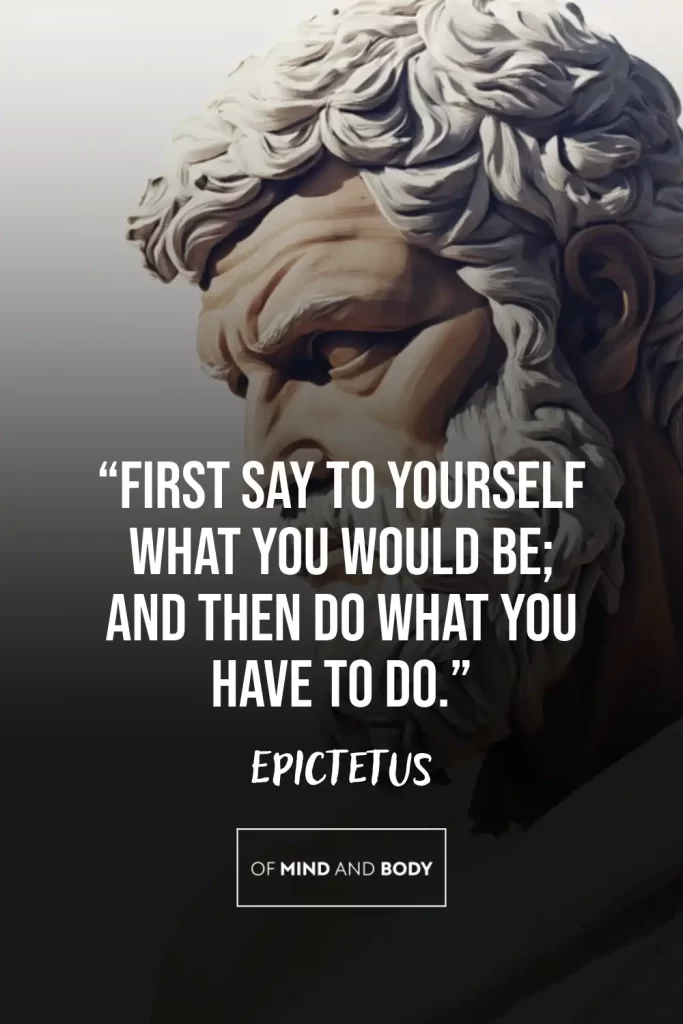
The Wisdom Behind the Words:
Epictetus is emphasising the importance of self-knowledge and intentionality in this quote. Before taking any action, it’s crucial to define clearly who you want to become. This clarity of vision is the foundation upon which you can build your actions and decisions. By first deciding what kind of person you want to be, you create a guiding principle that informs all subsequent behaviours. This approach aligns with the Stoic idea of living in accordance with virtue and reason, where every action is deliberate and purpose-driven.
Modern-Day Application:
In modern life, where distractions are endless and the pace is fast, many people drift through their days without a clear sense of purpose. These Quotes of Epictetus serve as a powerful reminder to pause and reflect on who you want to become before acting. Whether it’s in your career, personal life, or social interactions, defining your values and goals upfront helps ensure that your actions are aligned with your true self. This can lead to a more fulfilling and authentic life, as you’re not just reacting to circumstances but actively shaping your destiny. For example, if you aspire to be a compassionate leader, you must cultivate empathy and make decisions that reflect this aspiration.
#7
“We cannot choose our external circumstances, but we can always choose how we respond to them.”
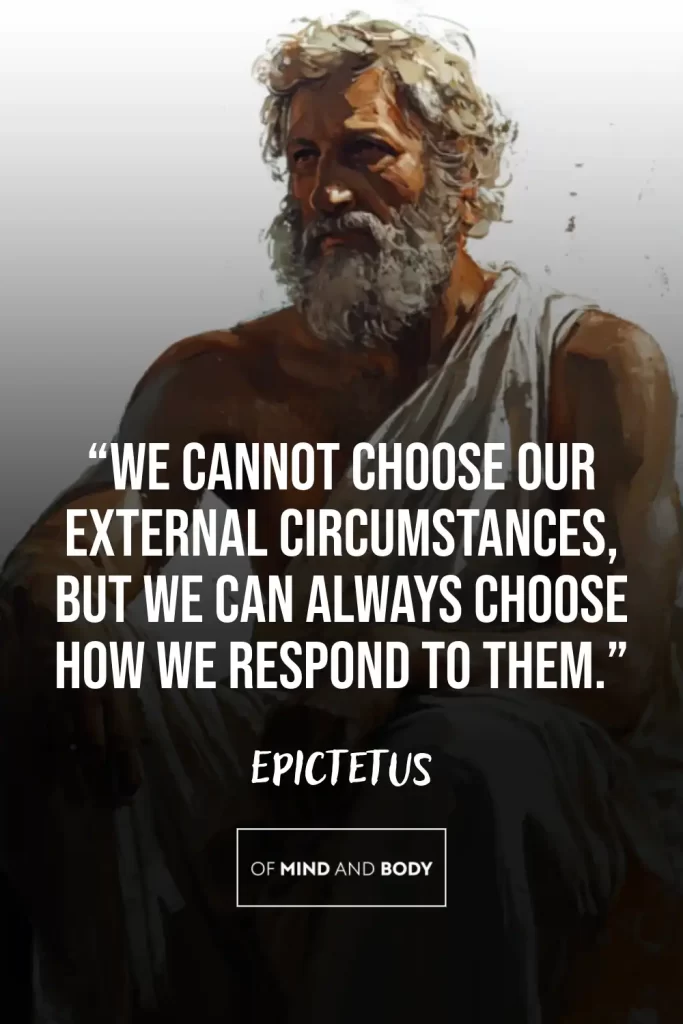
The Wisdom Behind the Words:
This quote reiterates a central theme in Stoicism: while external events are beyond our control, our responses are entirely within our power. Epictetus teaches that the key to resilience and inner peace lies in this choice. External circumstances, no matter how challenging, do not determine our happiness or contentment—our reactions do. This wisdom encourages a shift from a victim mentality to one of empowerment, where the focus is on managing our internal state rather than trying to control the uncontrollable.
Modern-Day Application:
In today’s world, these Stoic Quotes of Epictetus are immensely applicable. Life is full of unexpected challenges—ranging from personal losses to global crises—that we cannot predict or prevent. However, how we respond to these events is within our control and can make all the difference in our experience of life. By practising emotional regulation, mindfulness, and rational thinking, we can choose responses that reflect our values and contribute to our well-being. For instance, in the face of a job loss, instead of succumbing to despair, one could choose to view it as an opportunity for growth or a new direction, thus maintaining a sense of control and optimism.
#8
“I cannot escape death, but at least I can escape the fear of it.”
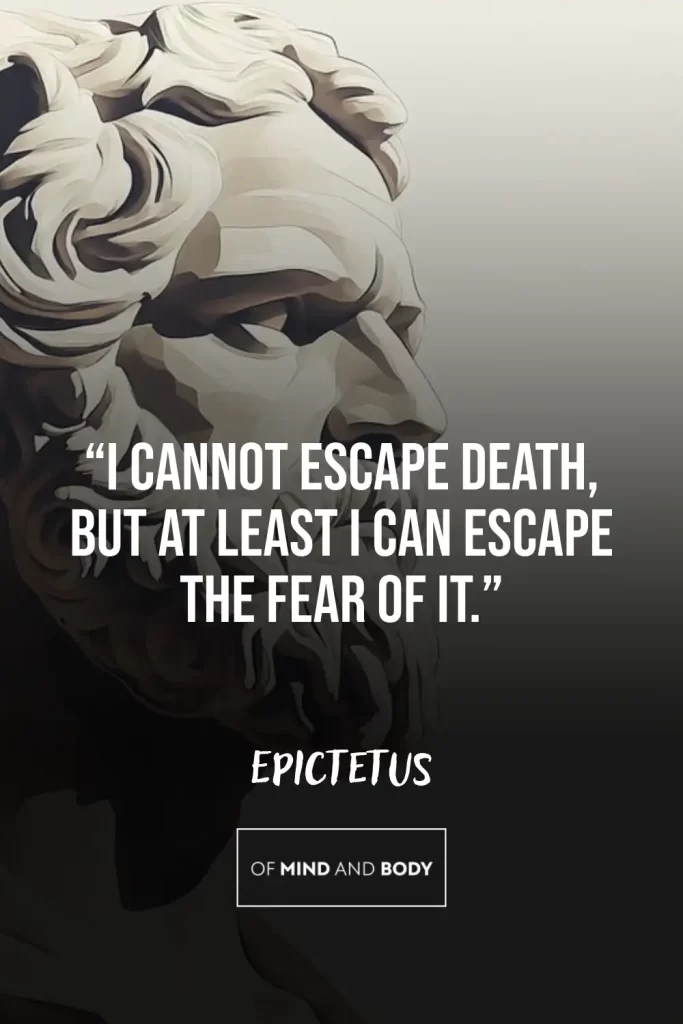
The Wisdom Behind the Words:
Epictetus addresses one of humanity’s greatest fears—death—in this quote, offering a Stoic perspective that focuses on the inevitability of death while rejecting the fear associated with it. The wisdom here lies in accepting death as a natural part of life, something that is beyond our control and therefore not worth fearing. By shifting the focus from the fear of death to the acceptance of it, Epictetus suggests that we can live more fully and freely, unburdened by the anxiety of an inescapable end.
Modern-Day Application:
In modern society, where death is often a taboo subject and many people live in fear of it, these Quotes of Epictetus are particularly liberating. By embracing the inevitability of death, we can reduce the anxiety that comes from trying to avoid or deny it. This acceptance allows us to live more intentionally, focusing on what truly matters rather than being paralysed by fear. For example, instead of obsessing over extending life at all costs, one might prioritise living a meaningful life, cultivating relationships, and pursuing passions. This mindset can lead to greater peace of mind and a richer, more fulfilling life.
#9
“No man is free who is not master of himself.”
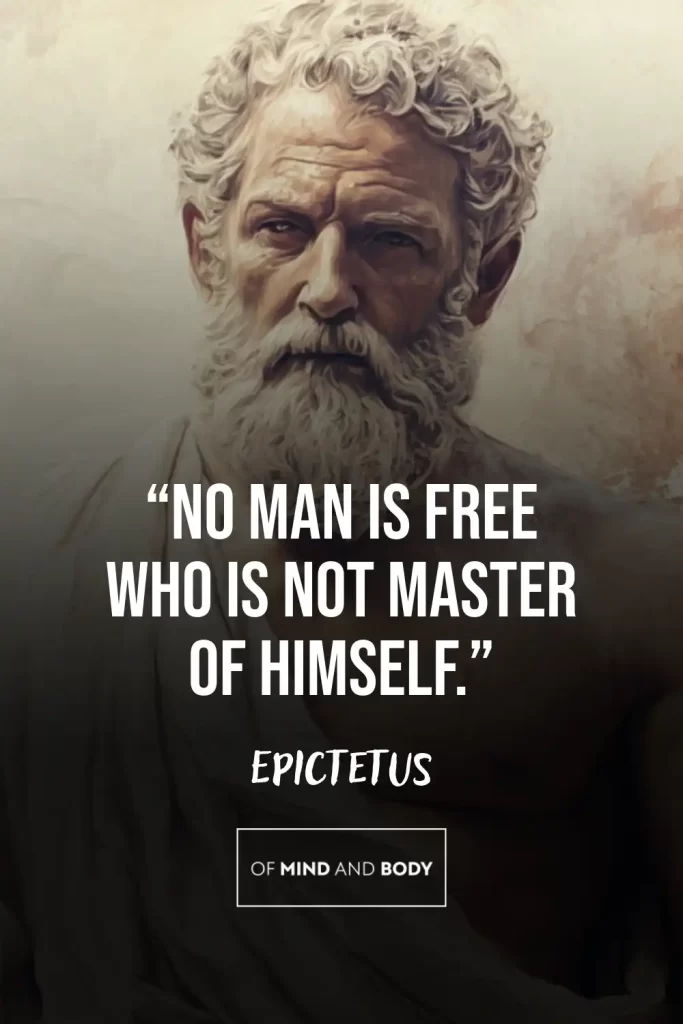
The Wisdom Behind the Words:
Epictetus argues that true freedom is not about external conditions but about self-mastery. To be free, one must be in control of their own thoughts, emotions, and desires. This inner mastery is what liberates a person from being a slave to external circumstances, societal pressures, or internal compulsions. The wisdom here is that freedom is an internal state, achieved through discipline, self-awareness, and the ability to govern one’s own mind and actions.
Modern-Day Application:
In today’s world, where external freedoms are often emphasised, these Stoic Quotes of Epictetus remind us that real freedom begins within. No amount of external liberty can compensate for a lack of self-control. For example, someone may live in a free society yet be enslaved by addictions, anxieties, or negative thought patterns.
Achieving self-mastery through practices like meditation, self-discipline, and emotional intelligence can lead to true freedom, where one is not easily swayed by external forces or internal turmoil. This kind of freedom is empowering, enabling individuals to live authentically and make choices that align with their deepest values.
#10
“Freedom is the only worthy goal in life. It is won by disregarding things that lie beyond our control.”

The Wisdom Behind the Words:
Epictetus elevates freedom as the ultimate goal, achievable by letting go of concerns over things we cannot control. This quote reflects the Stoic ideal of focusing solely on what is within our power—our thoughts, actions, and reactions—while disregarding the external factors that we cannot influence. By doing so, we attain a form of freedom that is immune to external circumstances, a freedom rooted in self-determination and inner peace.
Modern-Day Application:
In the modern context, where many people are overwhelmed by the pressures and expectations imposed by society, the Stoic Quotes of Epictetus provide a path to liberation. This teaches that by letting go of the need to control or worry about external events, we can achieve a profound sense of freedom. For instance, rather than stressing about other people’s opinions, societal trends, or unpredictable events, we can focus on our own actions, thoughts, and responses. This approach not only reduces stress but also empowers us to live more authentically, free from the chains of external validation or fear of the unknown.
Enjoying this article?
Try The Philosophy of Epictetus: Awesome Wisdom for a Flourishing Life
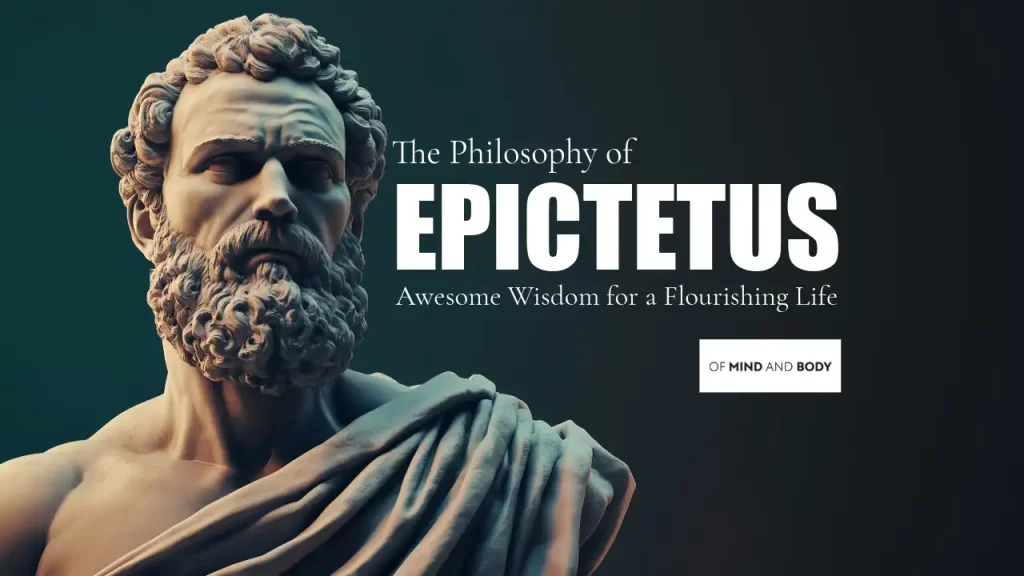
#11
“There is only one way to happiness and that is to cease worrying about things which are beyond the power of our will.”

The Wisdom Behind the Words:
Epictetus points out a crucial truth about happiness in this quote: it is intrinsically linked to our ability to let go of concerns over things we cannot control. Worrying about what lies beyond our influence is not only futile but also detrimental to our peace of mind. This wisdom reflects the Stoic principle of focusing solely on what is within our control—our own thoughts, actions, and responses—while accepting the rest with equanimity. The idea is that true happiness comes from this acceptance and the freedom from unnecessary anxiety.
Modern-Day Application:
In today’s fast-paced and often chaotic world, people are prone to anxiety over many things outside their control—be it global events, the economy, or others’ opinions. These Stoic Quotes of Epictetus offer a timeless solution: by consciously choosing to stop worrying about uncontrollable factors, we can free ourselves from much of the stress that plagues modern life. Techniques like mindfulness and cognitive-behavioural approaches can help in distinguishing between what we can and cannot control, allowing us to focus our energy on what truly matters and leading to a more serene and happy existence.
#12
“How long are you going to wait before you demand the best for yourself?”
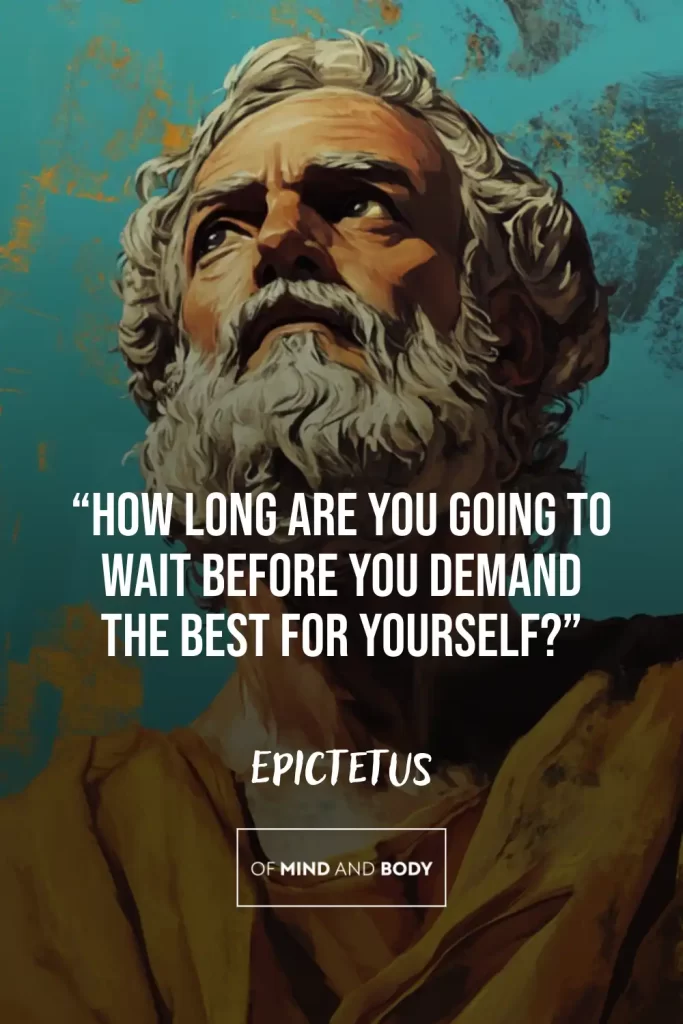
The Wisdom Behind the Words:
This quote is a call to action, urging individuals to stop delaying their pursuit of excellence and fulfilment. Epictetus is challenging us to take responsibility for our lives and to strive for the best version of ourselves, rather than settling for mediocrity or waiting for the “right time” to make changes. The wisdom here is that time is finite, and procrastination is the enemy of progress. By demanding the best for ourselves now, we assert control over our destiny and make the most of the opportunities at hand.
Modern-Day Application:
Procrastination and complacency are common pitfalls in the modern era, where distractions and comfort can easily lead to stagnation. These Stoic Quotes of Epictetus serve as a powerful reminder to take immediate action toward self-improvement and personal growth. Whether it’s pursuing a career goal, improving health, or cultivating relationships, the time to start is now. In practical terms, this could mean setting clear goals, creating actionable plans, and holding oneself accountable to higher standards, thereby making significant progress toward a more fulfilling life.
#13
“It is not death or pain that is to be dreaded, but the fear of pain or death.”
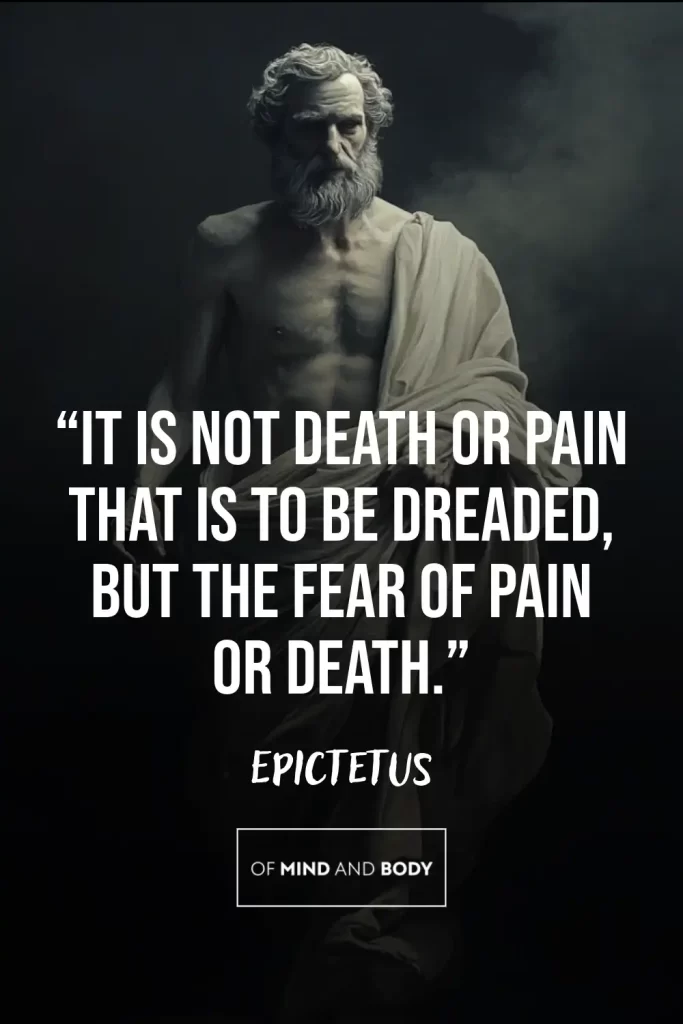
The Wisdom Behind the Words:
Epictetus delves into the nature of fear in this quote, distinguishing between the actual experiences of death and pain and the fear we build around them. He argues that it is not these events themselves that cause suffering, but our anticipation and dread of them. The wisdom here lies in understanding that fear magnifies suffering and that by overcoming fear, we can face life’s inevitable challenges with greater courage and composure.
Modern-Day Application:
In the modern world, where anxiety about the future—whether it concerns health, financial security, or mortality—can be overwhelming, these Stoic Quotes of Epictetus offer a path to inner peace. By re-framing our perspective and focusing on the present moment rather than on the fear of potential pain or death, we can reduce anxiety and live more fully. For instance, instead of fearing failure, one could approach challenges as opportunities for growth, thereby diminishing the power fear has over our lives and decisions. This approach can lead to a more courageous, resilient, and fulfilling life.
#14
“Seek not the good in external things; seek it in yourselves.”
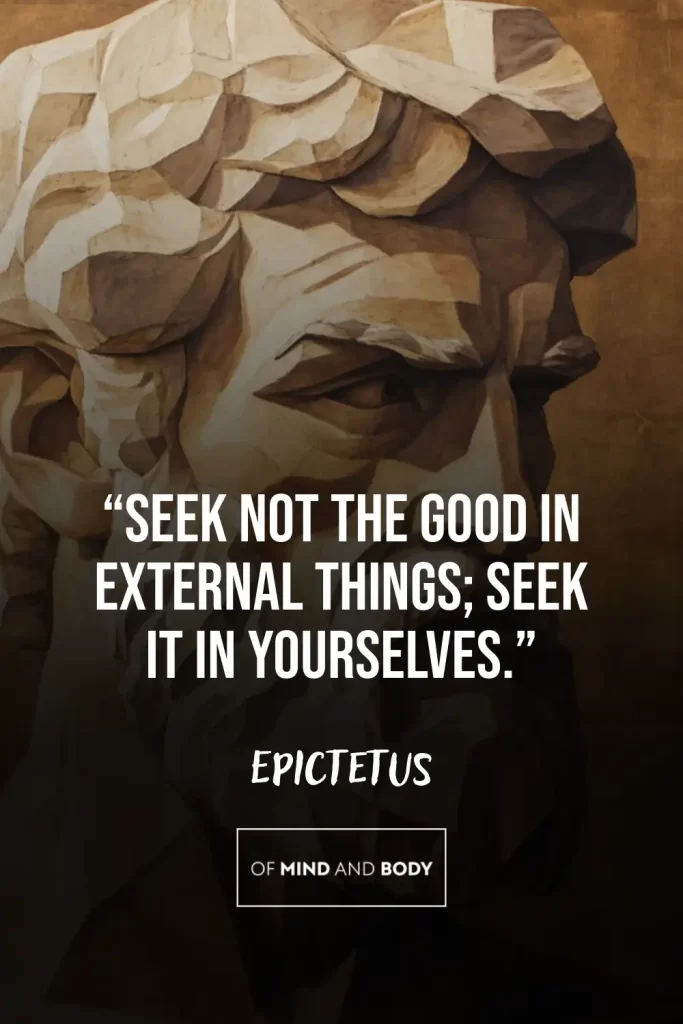
The Wisdom Behind the Words:
Epictetus advises that true goodness and fulfilment are not found in external possessions or circumstances, but within ourselves. This wisdom underscores the Stoic belief that inner virtues—such as wisdom, integrity, and self-control—are the true sources of a good life. By focusing on cultivating these internal qualities, rather than chasing external rewards, we can achieve lasting contentment and moral excellence.
Modern-Day Application:
In a world often obsessed with material success, status, and external validation, these Stoic Quotes of Epictetus are a powerful reminder to turn inward for true fulfilment. Instead of seeking happiness through wealth, possessions, or the approval of others, individuals can focus on personal growth, ethical living, and self-awareness. This might involve practices such as meditation, self-reflection, or engaging in meaningful work that aligns with one’s values. By doing so, we can build a strong inner foundation that remains stable regardless of external circumstances, leading to a more authentic and enduring sense of well-being.
#15
“Attach yourself to what is spiritually superior, regardless of what other people think or do. Hold to your true aspirations no matter what is going on around you.”

The Wisdom Behind the Words:
This quote from Epictetus emphasises the importance of aligning oneself with higher spiritual or moral principles, irrespective of societal pressures or the opinions of others. The wisdom here is that true fulfilment and purpose are found in staying true to one’s deepest values and aspirations, even when external circumstances or popular opinion may discourage it. This is a call to live with integrity, guided by a higher sense of purpose, rather than being swayed by the transient and often superficial concerns of the world.
Modern-Day Application:
In modern society, where peer pressure, social media influence, and cultural trends can easily divert us from our true path, this Quote from Epictetus is especially relevant. It encourages individuals to remain steadfast in their pursuit of what they believe to be right and meaningful, regardless of external influences. This might mean pursuing a career that aligns with your values, making lifestyle choices that reflect your ethics, or standing up for what you believe in, even if it is unpopular. By attaching yourself to what is spiritually superior, you build a life that is both authentic and resilient, grounded in your deepest convictions.
#16
“Don’t explain your philosophy. Embody it.”
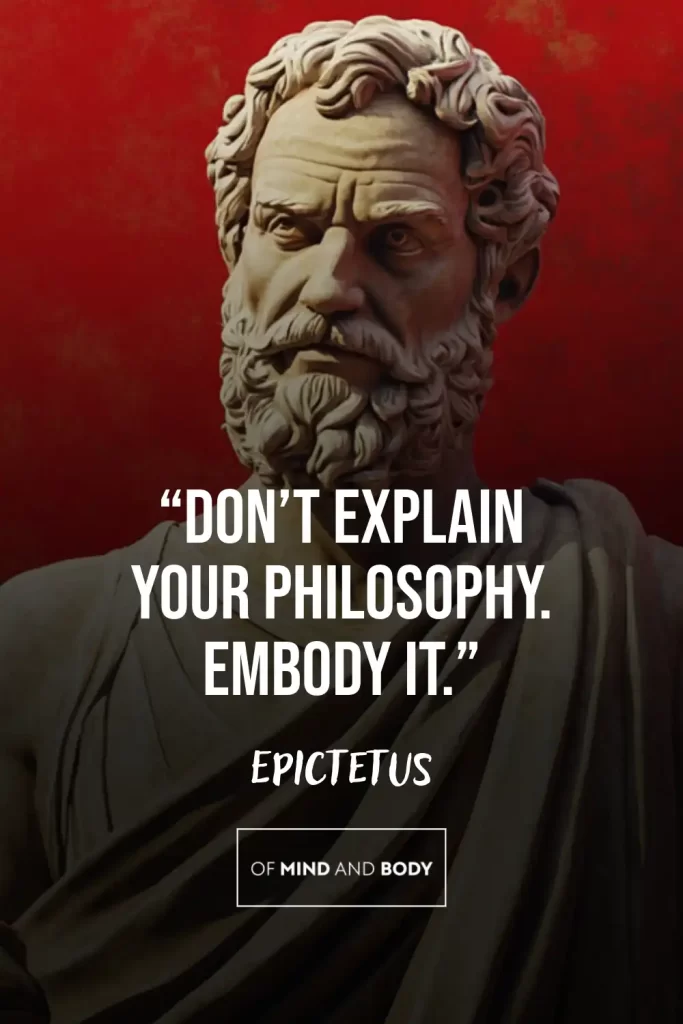
The Wisdom Behind the Words:
Epictetus emphasises the importance of living by example rather than merely speaking about one’s beliefs. The wisdom in this quote lies in the understanding that true philosophy is not about rhetoric or intellectual discussion, but about how one lives their life. Actions, more than words, reflect our deepest values and beliefs. By embodying our philosophy, we demonstrate its truth and power more effectively than through any verbal explanation.
Modern-Day Application:
In the contemporary world, where opinions and beliefs are often shared freely through social media and other platforms, these Stoic Quotes of Epictetus serve as a reminder that actions speak louder than words. Instead of merely talking about values such as honesty, kindness, or integrity, embodying these principles in daily life has a far greater impact. Whether in personal relationships, professional conduct, or social interactions, consistently living according to your beliefs sets a powerful example for others and builds authenticity and trust. This approach not only strengthens your own character but also inspires those around you to act in alignment with their values.
#17
“If you wish to be a writer, write.”

The Wisdom Behind the Words:
Epictetus succinctly captures the essence of becoming skilled in any endeavour: action. The wisdom here is in the simplicity of the message—desire alone is not enough; consistent practice and effort are essential. This quote encourages us to take the necessary steps to realise our ambitions, reminding us that mastery comes through doing, not just wishing or planning.
Modern-Day Application:
In today’s world, where many people dream of success but are often paralysed by fear of failure or perfectionism, this Epictetus Stoic Quote offers a practical guide: start doing. Whether it’s writing, painting, coding, or any other skill, the key to progress is action. This principle can be applied to any area of life; instead of waiting for the perfect moment or ideal conditions, begin the work now. For an aspiring writer, for instance, it means sitting down each day and writing, regardless of the quality or outcome. This consistent practice not only improves skill but also builds discipline and resilience, essential qualities for long-term success.
#18
“Circumstances don’t make the man, they only reveal him to himself.”

The Wisdom Behind the Words:
Epictetus highlights a fundamental Stoic belief that external circumstances do not define a person’s character; rather, they reveal it. This wisdom suggests that challenges and difficulties do not shape who we are but instead uncover our true nature—our strengths, weaknesses, virtues, and vices. The way we respond to circumstances reflects our inner values and the work we’ve done on ourselves.
Modern-Day Application:
In modern life, where unexpected challenges are a given, the Stoic Quotes of Epictetus remind us that our reactions to these situations reveal our true character. For example, how we handle stress, adversity, or success shows our resilience, humility, or hubris. Understanding this can lead to greater self-awareness and personal growth. By observing our reactions to life’s events, we can identify areas for improvement and work on becoming the person we aspire to be. This approach transforms challenges from mere obstacles into opportunities for self-discovery and growth, helping us build a stronger, more virtuous character.
#19
“We have two ears and one mouth so that we can listen twice as much as we speak.”

The Wisdom Behind the Words:
Epictetus uses this quote to emphasise the importance of listening over speaking. The wisdom in this adage lies in the understanding that communication is more effective and meaningful when it involves careful listening. Listening allows us to understand others better, learn from them, and respond thoughtfully. It also reflects humility and respect for others’ perspectives, which are key Stoic virtues.
Modern-Day Application:
In a world where people often feel the need to voice their opinions quickly, sometimes at the expense of understanding others, the Stoic Quotes of Epictetus encourage a shift in focus. By listening more than we speak, we can improve our relationships, make better decisions, and foster a more collaborative and understanding environment. This principle is particularly valuable in both personal and professional settings, where effective communication is crucial. By actively listening, we can respond more thoughtfully, avoid misunderstandings, and build stronger connections with others, leading to more meaningful and productive interactions.
#20
“The wise man loves, but he loves only what is in his power.”

The Wisdom Behind the Words:
This quote reflects the Stoic idea that wisdom involves understanding the limits of our control, even in matters of love. Epictetus suggests that a wise person loves not indiscriminately but with a discerning heart, focusing affection on what is within their control—such as their own virtues, choices, and actions—rather than on external things or people, which are beyond their control. This approach to love is rooted in self-mastery and a realistic view of what can be influenced.
Modern-Day Application:
In modern relationships, the Stoic Quotes of Epictetus serve as a guide to healthy and balanced love. This encourages us to invest emotionally in what we can influence—our own behaviour, values, and responses—rather than trying to control or change others. This perspective can lead to more fulfilling relationships, as it reduces the frustration that comes from unmet expectations or trying to control external circumstances. By focusing on what is within our power, such as being kind, supportive, and understanding, we can foster genuine love and connection, while also maintaining emotional resilience and independence.
#21
“If you want to improve, be content to be thought foolish and stupid.”

The Wisdom Behind the Words:
Epictetus highlights the humility required for personal growth. The wisdom here lies in recognising that true improvement often involves making mistakes, taking risks, and enduring the judgement of others. Being “content to be thought foolish and stupid” means embracing the learning process, which may sometimes expose our ignorance or inexperience. It’s a call to prioritise long-term growth over short-term appearances, accepting that the path to wisdom and skill is often paved with moments of discomfort and vulnerability.
Modern-Day Application:
In a society where image and perception are often overvalued, these Stoic Quotes of Epictetus serve as a powerful reminder that growth requires stepping outside one’s comfort zone. Whether it’s learning a new skill, starting a new career, or adopting a new mindset, improvement often comes with challenges that might make us appear unpolished or naive at first. However, by embracing this phase without concern for others’ judgements, we allow ourselves the freedom to truly grow. This approach is particularly relevant in creative fields, entrepreneurship, or any area where innovation requires experimentation and the willingness to appear “foolish” in the eyes of the status quo.
#22
“Progress is not achieved by luck or accident, but by working on yourself daily.”
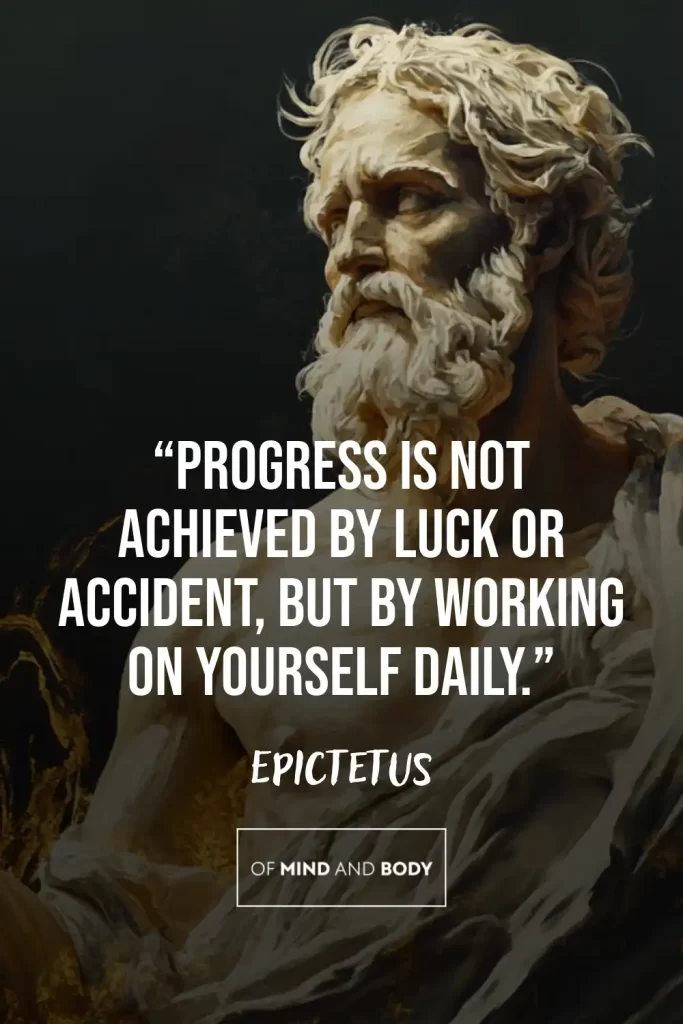
The Wisdom Behind the Words:
Epictetus stresses the importance of consistent effort in self-improvement. This quote underscores the Stoic belief that progress is the result of deliberate, daily practice rather than chance. The wisdom here is that meaningful growth comes from disciplined, intentional actions over time. It’s a reminder that luck or external circumstances are not the primary drivers of success; instead, it’s the continuous work on oneself that leads to real advancement.
Modern-Day Application:
In an age where quick fixes and instant gratification are often sought, these Stoic Quotes of Epictetus serve as a crucial reminder that lasting progress is built on daily habits and consistent effort. Whether in personal development, professional achievements, or health, the principle of incremental progress through daily work is timeless. For example, in fitness, consistent daily exercise yields better results than sporadic, intense efforts. Similarly, in personal growth, daily reflection, learning, and practice are the building blocks of significant change. This quote encourages a mindset of patience and persistence, focusing on long-term gains rather than immediate rewards.
#23
“Man is not worried by real problems so much as by his imagined anxieties about real problems.”
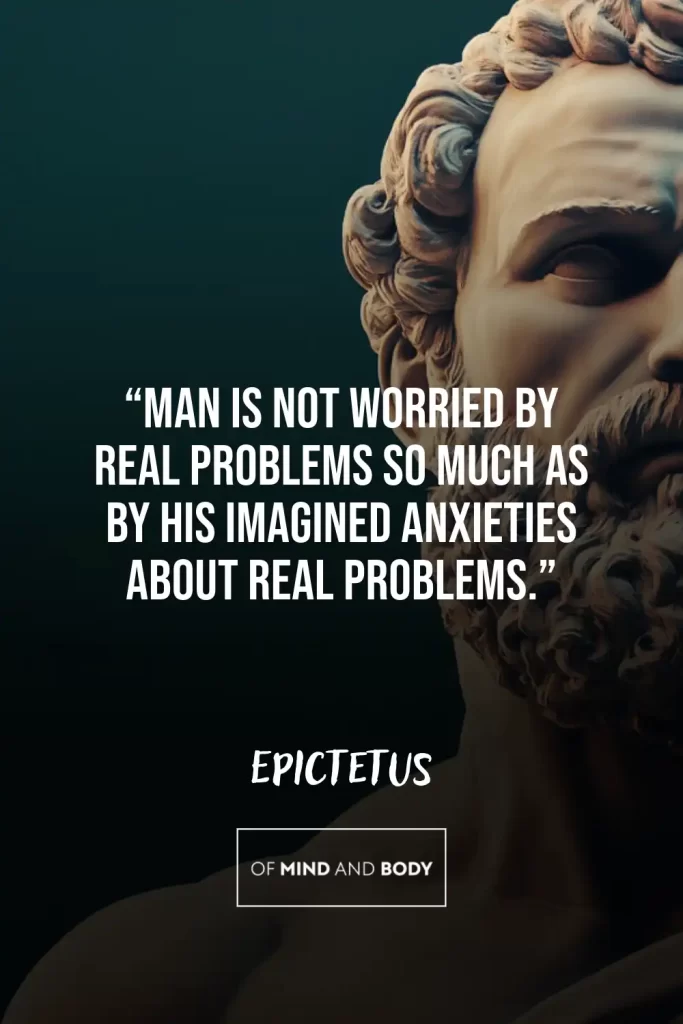
The Wisdom Behind the Words:
Epictetus identifies the human tendency to amplify our worries through imagination. The wisdom here is that much of our anxiety comes not from actual events or challenges but from our exaggerated fears and predictions about them. This quote encourages us to differentiate between real, present challenges and the often unfounded anxieties that our minds create. It’s a call to focus on what is actually happening rather than what we fear might happen.
Modern-Day Application:
In today’s world, where stress and anxiety are common, the Stoic Quotes of Epictetus are particularly relevant. Many people find themselves overwhelmed not by actual events but by their fears of what could go wrong. This quote encourages mindfulness and the practice of staying grounded in the present reality rather than getting lost in worst-case scenarios. Techniques such as cognitive-behavioural therapy (CBT), which helps individuals challenge and re-frame negative thought patterns, can be useful in addressing these imagined anxieties. By focusing on actual problems and solutions, rather than potential disasters, we can reduce unnecessary stress and lead a more balanced life.
#24
“Any person capable of angering you becomes your master; he can anger you only when you permit yourself to be disturbed by him.”

The Wisdom Behind the Words:
Epictetus highlights the Stoic belief in the importance of emotional self-control. The wisdom here is that allowing someone to provoke anger in us gives them power over our emotions. By reacting with anger, we surrender our autonomy and let others dictate our state of mind. This quote encourages the practice of equanimity and the development of inner strength, where we choose our reactions rather than being controlled by external provocations.
Modern-Day Application:
In our daily interactions, whether in personal relationships, at work, or online, it’s easy to be provoked by others. These Stoic Quotes of Epictetus serve as a reminder that true freedom lies in our ability to control our reactions. By practising emotional intelligence and self-awareness, we can choose not to let others’ words or actions disturb our peace. This doesn’t mean suppressing emotions but rather managing them in a way that maintains our inner calm and autonomy. For example, instead of reacting with anger to a rude comment, we might choose to respond with calmness or even humour, thereby maintaining control over our emotional state and not allowing the provocateur to “master” us.
#25
“He who laughs at himself never runs out of things to laugh at.”
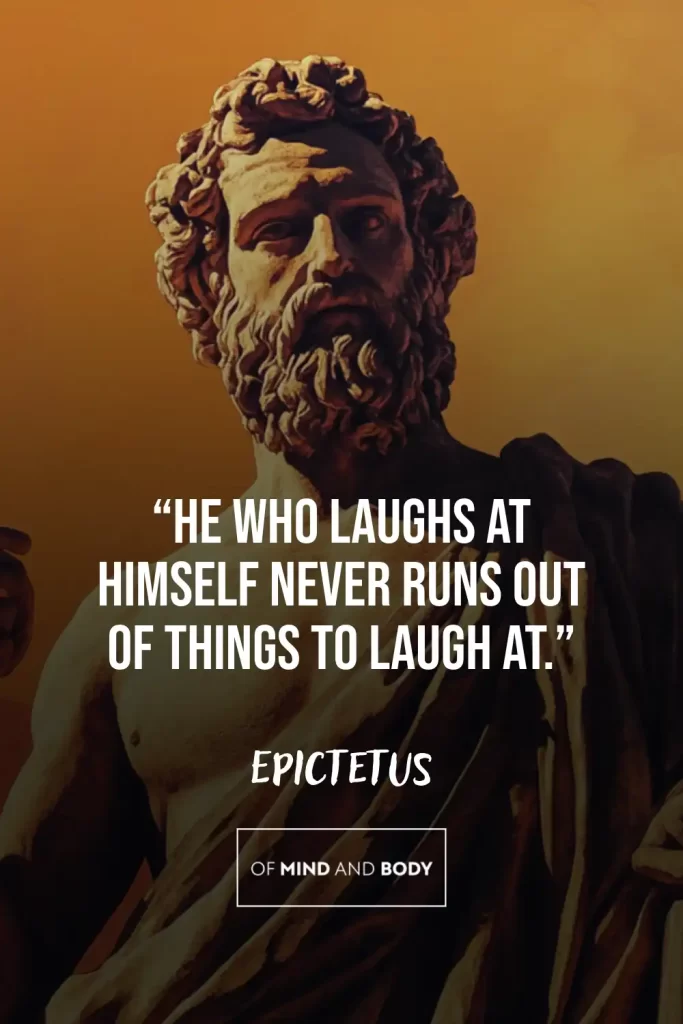
The Wisdom Behind the Words:
Epictetus captures the essence of humility and self-awareness in this quote. The wisdom here is that by learning to laugh at ourselves, we not only disarm the power of others to ridicule us but also cultivate a lighthearted approach to our own imperfections and mistakes. This ability to laugh at oneself is a sign of maturity and self-confidence, reflecting a deep understanding that human flaws and errors are natural and often humorous.
Modern-Day Application:
In the modern world, where social pressures and the fear of judgement can be overwhelming, the Stoic Quotes of Epictetus encourage us to embrace our humanity with a sense of humour. By not taking ourselves too seriously, we can navigate life’s challenges with greater ease and resilience. This approach can also diffuse tension in difficult situations and improve our relationships with others. For instance, in a work environment, being able to laugh at one’s own mistakes can foster a more positive atmosphere and reduce stress. It also encourages a culture of openness and learning, where mistakes are seen as opportunities for growth rather than sources of embarrassment.
#26
“It is impossible for a man to learn what he thinks he already knows.”
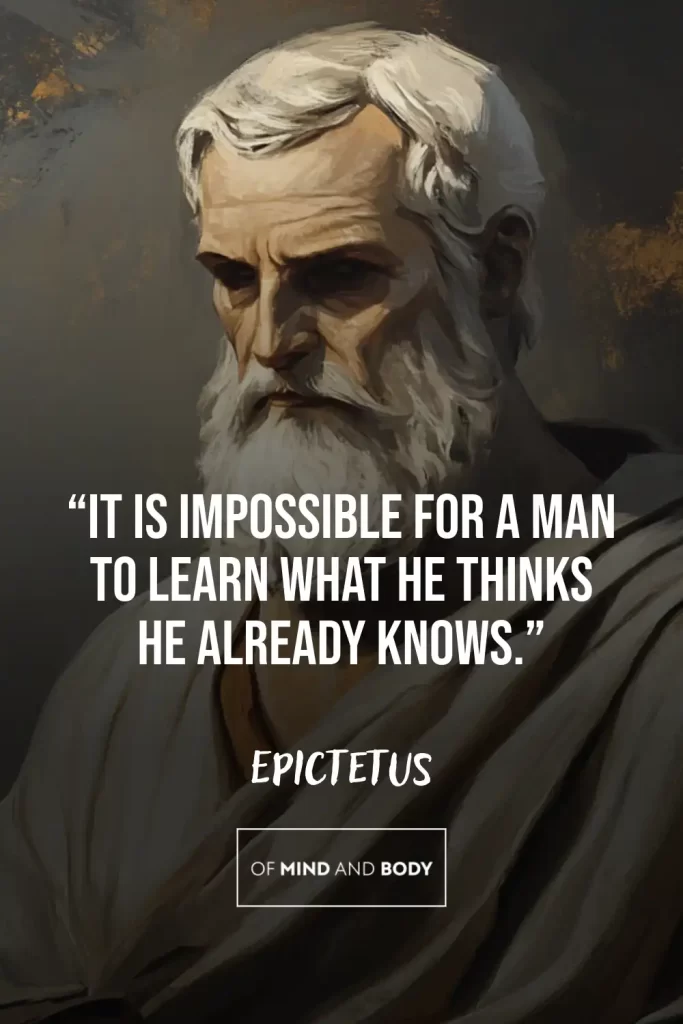
The Wisdom Behind the Words:
Epictetus highlights the barriers that arrogance and closed-mindedness create to personal growth and learning. The wisdom in this quote lies in the understanding that a true learner approaches life with humility, acknowledging that there is always more to learn. When someone believes they already know something, they shut themselves off from new information, perspectives, and insights, effectively stunting their intellectual and personal development.
Modern-Day Application:
In today’s rapidly changing world, continuous learning is essential for personal and professional success. The Stoic Quotes of Epictetus remind us of the dangers of complacency and intellectual arrogance. Whether in business, technology, or personal growth, assuming that we “know it all” can prevent us from adapting to new circumstances or understanding deeper truths.
Cultivating a mindset of curiosity and openness allows us to keep evolving. For instance, professionals who continue to learn and grow in their field, rather than relying solely on past knowledge, are better equipped to innovate and stay relevant. This quote encourages embracing a lifelong learning attitude, where humility is the foundation of wisdom.
#27
“Other people’s views and troubles can be contagious. Don’t sabotage yourself by unwittingly adopting negative, unproductive attitudes through your associations with others.”

The Wisdom Behind the Words:
Epictetus warns about the influence of others’ attitudes and behaviours on our own mental state. The wisdom here is the recognition that we are social beings, and our environments and associations deeply affect our thoughts and actions. By surrounding ourselves with negativity or unproductive mindsets, we risk adopting these attitudes, which can sabotage our well-being and progress. This quote advises mindfulness in choosing our social circles and being aware of the subtle ways in which others’ attitudes can shape our own.
Modern-Day Application:
In the modern context, where social interactions (both online and offline) are a significant part of life, this Stoic Quote from Epictetus is particularly relevant. The company we keep, including the media we consume and the people we interact with, can greatly influence our mindset. If we regularly engage with negative, cynical, or unproductive people, their attitudes can seep into our own thinking, leading to stress, pessimism, or stagnation. This quote encourages us to be selective about our associations, seeking out positive, constructive influences that uplift and inspire us. For example, connecting with communities that focus on growth, positivity, and support can enhance our mental resilience and drive.
#28
“I laugh at those who think they can damage me. They do not know who I am, they do not know what I think, they cannot even touch the things which are really mine and with which I live.”

The Wisdom Behind the Words:
Epictetus asserts the inviolability of one’s inner life in this quote, emphasising that external threats or insults cannot truly harm us unless we allow them to. The wisdom here is in recognising the distinction between what is within our control (our thoughts, beliefs, and values) and what is not (others’ opinions or actions). By maintaining a strong inner sense of self, we become impervious to external attempts to harm or diminish us, finding strength in the knowledge that our true self is untouchable.
Modern-Day Application:
In an era where public opinion, social media, and external judgements can feel overwhelming, these Stoic Quotes of Epictetus offer a powerful defence: the understanding that our true essence—our thoughts, beliefs, and inner values—cannot be damaged by others. This mindset is particularly empowering in situations of criticism, gossip, or social pressure.
By focusing on our internal values and what truly matters to us, we can remain steadfast and unbothered by external negativity. For example, someone facing harsh criticism in their work can choose to focus on their own standards of integrity and purpose, rather than being swayed by others’ opinions. This approach fosters inner strength and resilience, allowing us to live authentically and confidently.
#29
“Small-minded people blame others. Average people blame themselves. The wise see all blame as foolishness.”
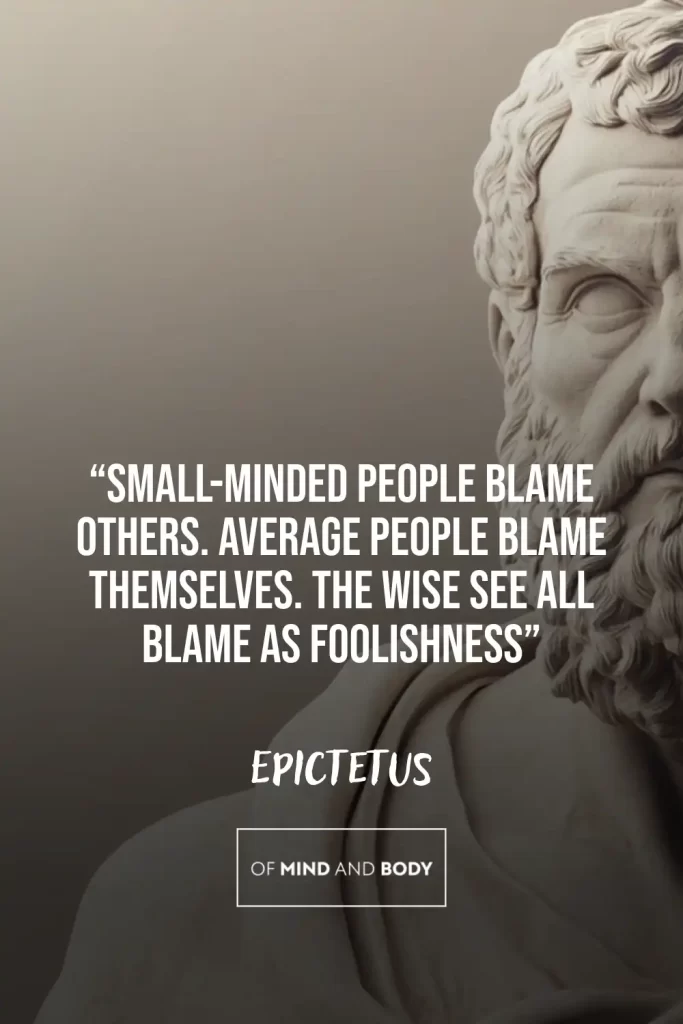
The Wisdom Behind the Words:
Epictetus explores the concept of blame and its futility in this quote. The wisdom here lies in the understanding that blame, whether directed at others or oneself, is unproductive and often rooted in a limited perspective. The truly wise understand that instead of assigning blame, one should focus on understanding, learning, and moving forward. Blame is seen as a distraction from taking responsibility and making positive changes.
Modern-Day Application:
In modern life, where accountability is crucial, these Stoic Quotes of Epictetus suggest a higher level of responsibility that transcends blame. In both personal and professional contexts, shifting from a blame-oriented mindset to one focused on solutions and growth can lead to better outcomes.
For instance, in a team setting, instead of blaming colleagues for a failed project, the wise approach would be to analyse what went wrong, learn from the experience, and work together to improve future efforts. This mindset encourages a culture of continuous improvement and collaboration, rather than one of fault-finding and negativity.
#30
“You become what you give your attention to.”
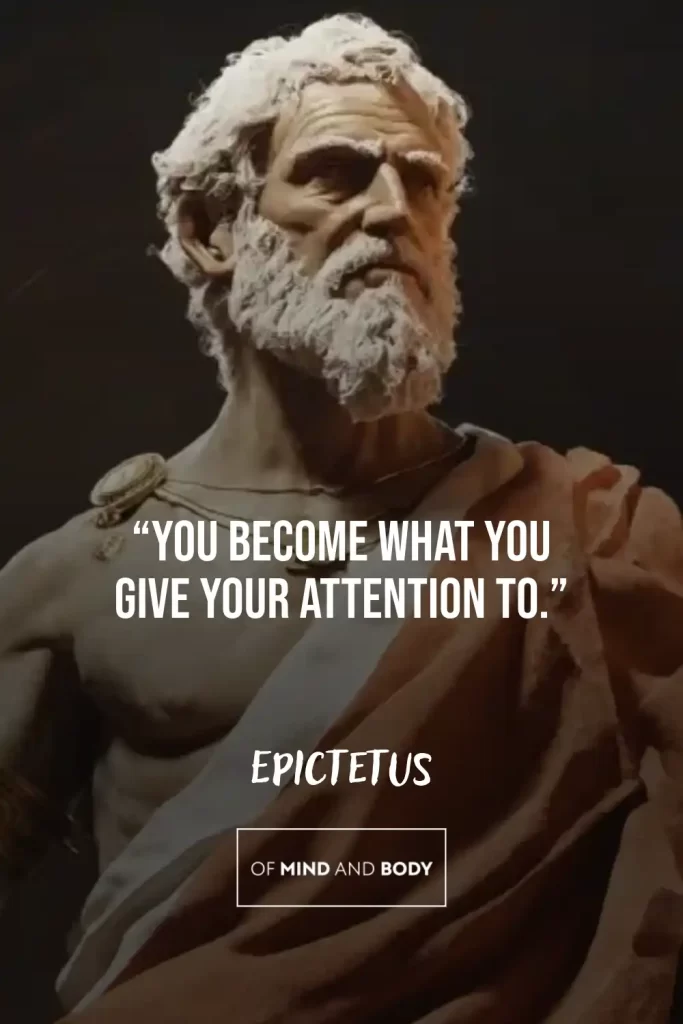
The Wisdom Behind the Words:
Epictetus highlights the power of focus and attention in shaping our character and destiny. The wisdom in this quote is the recognition that what we consistently focus on, think about, and invest our time in, ultimately defines who we become. By choosing our focus wisely, we can deliberately shape our lives and personal development. This quote echoes the Stoic emphasis on mindfulness and intentionality in every aspect of life.
Modern-Day Application:
In today’s world, where distractions abound and attention is constantly pulled in multiple directions, these Stoic Quotes of Epictetus are a profound reminder of the importance of mindful attention. Whether it’s the media we consume, the goals we pursue, or the people we interact with, what we give our attention to deeply influences our thoughts, behaviours, and ultimately, our identity.
For example, if we focus on negative news and toxic social media, our worldview and mood can become negative and cynical. Conversely, by directing our attention toward positive, constructive activities—such as learning, personal growth, and meaningful relationships—we can cultivate a more fulfilling and purposeful life. This quote encourages us to be intentional about where we direct our focus, knowing that it plays a crucial role in shaping who we are.
Final Thoughts
As we conclude this exploration of the quotes of Epictetus, it’s clear that the wisdom of this ancient Stoic philosopher transcends time, offering profound insights that are as relevant today as they were centuries ago. By embracing these teachings, we can cultivate a life grounded in virtue, resilience, and inner peace, regardless of the challenges we face. Epictetus reminds us that true power lies within—how we think, how we respond, and how we choose to live our lives. As you reflect on these quotes, consider how you can apply this timeless wisdom to your own journey, guiding you toward a more purposeful and fulfilling existence.


